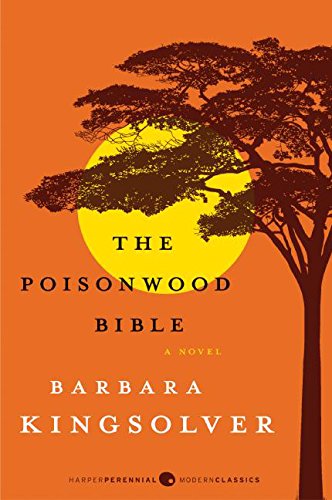The Poisonwood Bible by Barbara Kingsolver is a mesmerizing and thought-provoking novel that delves into the depths of human nature, the consequences of colonialism, and the enduring power of redemption. Set against the backdrop of the Belgian Congo in the late 1950s, this literary masterpiece weaves together the intricate stories of the Price family, as they struggle to adapt to their new environment while facing their own personal demons.
The novel unfolds through the alternating perspectives of the Price women—Orleanna, the mother, and her four daughters: Rachel, Leah, Adah, and Ruth May. Each voice is distinct, offering a unique lens through which to view their experiences in the Congo. Kingsolver's masterful storytelling allows readers to empathize with and understand the hopes, fears, and desires of each character.
Nathan Price, the patriarch of the family, is a fiercely zealous Baptist missionary who drags his reluctant family into the heart of the African continent. His unwavering devotion to his faith blinds him to the cultural, political, and social complexities of the Congo. Through Nathan's character, Kingsolver paints a searing portrait of the destructive force of religious fanaticism and the repercussions it has on both the individual and the community.
The Congo itself becomes a character in the story, vividly portrayed with its lush landscapes, rich flora and fauna, and underlying tension simmering beneath the surface. Kingsolver's meticulous attention to detail and her ability to evoke the senses immerse readers in the sights, sounds, and smells of the African jungle. The juxtaposition of the beauty and brutality of the environment creates a palpable sense of unease, mirroring the tumultuous events unfolding within the narrative.
One of the novel's greatest strengths lies in its exploration of the effects of colonialism. Kingsolver masterfully showcases the clash between Western imperialism and the indigenous cultures of the Congo, highlighting the devastating consequences of cultural arrogance and the erasure of local traditions. Through the Price family's experiences, we witness the destructive impact of colonization on both the land and its people, as well as the resilience and indomitable spirit of those who fight to maintain their identity and dignity.
Moreover, The Poisonwood Bible delves into the complexities of family dynamics, with each sister embodying a distinct archetype. Rachel, the oldest, represents the oblivious and materialistic American dream. Leah, the rebellious and passionate daughter, grapples with her own beliefs and questions the ideals she has been raised with. Adah, the disabled and introspective twin, provides a unique perspective on the world, infusing the narrative with her own brand of wit and wisdom. And Ruth May, the youngest, is the innocent voice of the story, embodying the tragic loss of innocence that permeates the novel.
Kingsolver's prose is poetic and lyrical, laced with metaphor and symbolism that elevate the narrative to a higher plane. The depth of her research and her ability to seamlessly integrate historical events into the story add layers of authenticity and richness to the overall reading experience. Moreover, her skillful use of foreshadowing and non-linear storytelling keeps readers engaged and invested in the outcome, making it impossible to put the book down.
The Poisonwood Bible is not merely a story of colonization or religious fanaticism; it is a powerful exploration of humanity's capacity for both destruction and redemption. Kingsolver's ability to depict the evolution of her characters in a realistic and compelling manner is a testament to her skill as a writer. As the Price family confronts their individual demons and grapples with their mistakes, the novel becomes a universal tale of growth, forgiveness, and the pursuit of personal truth.
In conclusion, The Poisonwood Bible is a literary masterpiece that will leave an indelible mark on its readers. Barbara Kingsolver's ability to tackle complex themes with grace, sensitivity, and unflinching honesty is awe-inspiring. The novel's enduring relevance and its ability to evoke a wide range of emotions make it a must-read for anyone seeking a profound and unforgettable reading experience.

Comments
Post a Comment